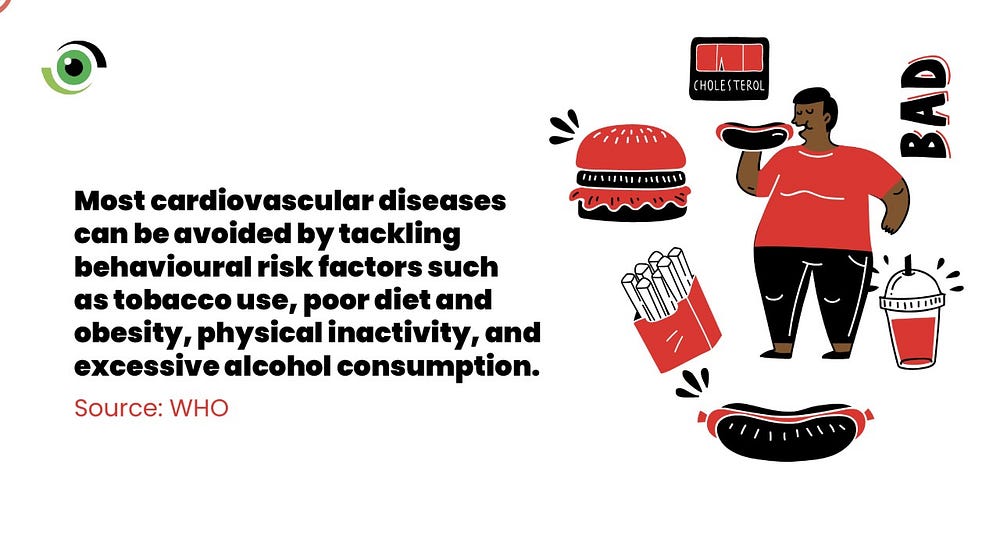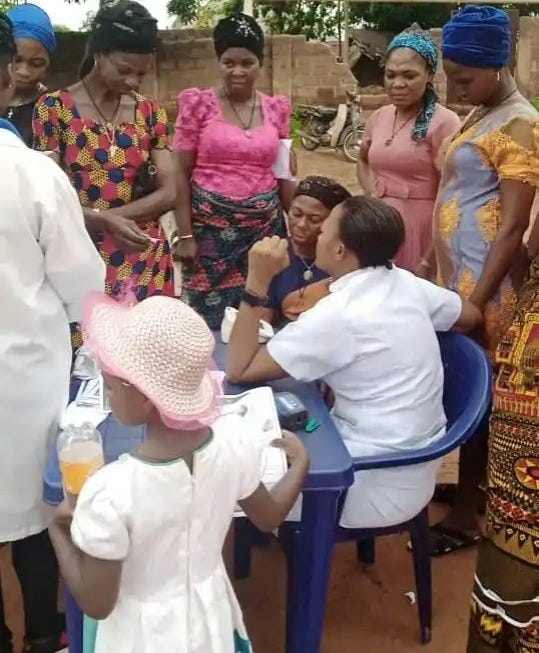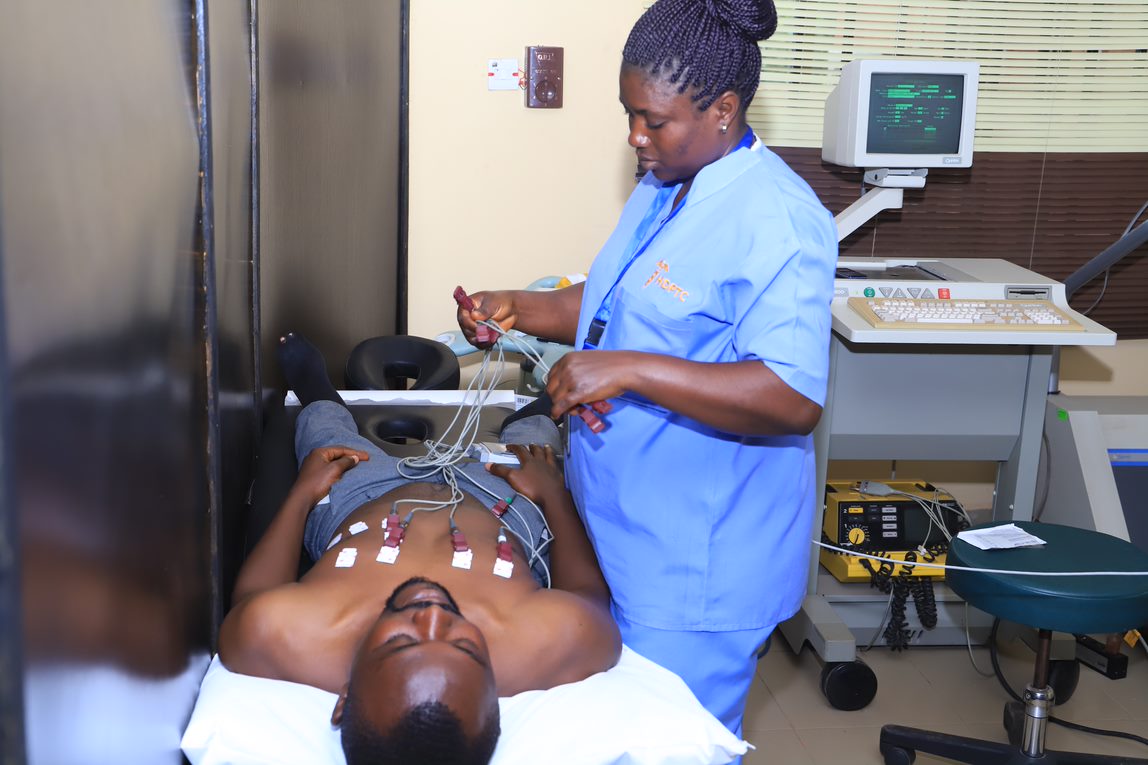By Beti Baiye and Oluwatoyosi Aibinuomo (Lead Writers)
Anyone watching 23-year-old Okenyi Collins as he went about his business at the Heart Disease Prevention and Training Centre (HDPTC) Nsukka, might have mistaken him for a caregiver to any of the elderly patients waiting to see the cardiologist. It was therefore interesting when he said he was at the Centre to see the doctor and had been doing so for more than four months.
Collins is a final year university student. Forced into a sedentary lifestyle by the recent strike action by the Academic Staff Union of Universities (ASUU), he spent his days eating, sleeping and surfing the internet. Then he developed severe pains in his chest region. “I have been to about four different hospitals. They carried out plenty tests and kept on telling me that there was nothing wrong with me, but I kept having the pains,” he said. He decided to visit HDPTC when one of the doctors suggested that he visit a cardiologist. “The cardiologist told me that as a result of the months of inactivity coupled with the food I’ve been eating; I have excess fat in my blood and It’s blocking my arteries.”
Clogged arteries can lead to serious, sometimes fatal consequences. Collins was thankful that he went to the doctor when he did, “I’ve been receiving treatment here for 3 months now. So far, though I’m not 100%, I feel better. The doctor had already told me that heart disease doesn’t just go. Because there was a build up before I began to feel the symptoms, the healing will be gradual as well”.
A dire situation
Cardiovascular diseases (CVD) have become a global concern. World Health Organization (WHO) data revealed that in 2019, over 17 million people died from cardiovascular diseases; about three-quarters of those deaths occurred in low- and middle-income countries. According to Dr Francis Asogwa, Interventional Cardiologist and Medical Director, HDPTC, “Hypertension prevalence in Nigeria is about 5.6%. These numbers come from studies done in teaching hospitals and communities. I can’t begin to tell you that of stroke, diabetes, chronic kidney disease but we know from research done and from experience that there is a surge of cardiovascular diseases in Nigeria and in Africa”. Hypertension is a major risk factor for heart disease and stroke and when a person has both high blood pressure and diabetes — which is a common combination — the risk of developing CVD increases.

Significant lifestyle changes — smoking, unhealthy diets, physical inactivity — and the resultant chronic conditions like hypertension, diabetes, obesity, have been linked to the surge in CVD. There is also poverty, stress, inequitable access to health care and a health system which lacks the needed human and financial resources to prevent and treat cardiovascular disease and its risk factors, which make the situation even more dire.
A welcome disruption
Dr Asogwa has always been passionate about tackling CVD in Nigeria and he thought he knew how to go about it, but a chance encounter in India disrupted his well laid plans. “A renowned professor who came to Mumbai to give a lecture on cardiovascular diseases said, ‘all of you here have come to learn how to repair defects in the heart…but if you want to do your people good, go back and teach them how to prevent these diseases.’ So, I went to India to acquire knowledge on curative, but I got the inspiration to come back home and prevent people from getting to the point where they would need my specialty”. At about the same time, he met Dr Ezeugwu, also an Interventional Cardiologist and visioner and founder of HDPTC. Together they came up with a three-part focus: teach people how to prevent CVD; train community health workers on basic and advanced life support and reduce the cost of treating CVD.

Teaching people how to prevent CVD begins with every patient enrolled in the facility. When a patient is diagnosed with hypertension, they make sure to educate the person about the possible causes and complications; plus, steps to take to avoid them. This is an important step in the process because “from experience, out of every 10 of our patients that suffered from a stroke, eight of them did not know that they were hypertensive and the other two that were aware that they were living with the condition never knew that it had no cure. They start their medications and soon as the pressure normalises, they stop taking their drugs and the next thing is they are coming down with stroke or a heart failure,” said Dr Asogwa.
The facility maintains an up-to-date Electronic Medical Register (EMR) where they capture all the data of every patient registered in the facility. This makes communicating with out-patients seamless, which they do weekly, bimonthly, or monthly, depending on the patient’s condition. Conscious of the fact that the EMR may contain sensitive information, access to certain sections of a patient’s data is on a need-to-know basis.

Preaching the prevention gospel
Driven by the lack of awareness exhibited by the patients they have seen; the Centre also carries out free community outreaches. MaryAnn Osuagwu, Community Liaison and National Health Insurance Scheme (NHIS) Desk Officer at the Centre said, “One day we went to one of the nearby communities on an outreach and found several men and women who had blood pressure readings of over 250. But they came to church and were dancing”. They take the outreaches to churches, markets, villages where they offer free blood pressure readings — and sometimes free drugs for those in critical conditions, debunk myths, and educate them on ways to prevent these conditions.

Addressing the cost of care
The cost of care for CVD is high and while their rates are already subsidised, if a patient requires specialised interventions and can’t afford it, “we take your social history and if you are an indigent patient, we enrol you and you access our services for free. Since we started, we have had about 7 or 8 such patients,” Asogwa said.

To further reduce the financial burden of treatment they recently got accredited by the NHIS and in a bid to encourage enrollment, through a random selection process, 200 persons were enrolled and will access care under the NHIS package for one year.

A remarkable add-on
The facility also has a library, and it’s not just for medical books. Besides the medical and academic tomes, it is fully stocked with thriller, crime, drama, fantasy and fairy-tale books with the works of John Grisham, C.S. Lewis, Enid Blyton and others on display. For anyone who grew up enjoying the now defunct traditional library structure, this is a fun place to be. It is managed by a librarian who said people can pay a token to access any book they want. “If you want to go with them, you register for a library card,” she added. There is also a mobile library team who visit secondary schools to sensitise students on the joys of reading and to talk to them about the library.

The heart disease centre has been in operation since July 2021. Setting up an operation of this magnitude is capital intensive and there is the constant need to ensure that their rates are low enough to be ‘affordable’ and high enough to keep the ‘lights on’. However, according to Asogwa, the centre isn’t generating enough funds yet. Kind donations from people who have visited the facility and international donors, have helped keep the place running. This underlines the need to revaluate its current operational system and establish solid funding mechanisms to ensure sustainability.
Clearly HDPTC is filling a vital gap in cardiovascular care in Enugu State. Prevention is a step in the right direction and health education is critical if the rising cases of hypertension, kidney disease and diabetes must be lowered. Collaboration with the state government and other relevant stakeholders in the state will help scale-up their operations and give them a wider reach than their capacity currently allows.
The team desires to leave the people they encounter with an increased awareness of the need to check their blood pressure and blood sugar regularly. Although their efforts could best be likened to ‘a drop in the ocean’, they hope it will inspire lifestyle changes among the people of Enugu State and eventually lead to a gradual reduction in the prevalence of cardiovascular disease.



Thank God for the man who saw far to establish this cardiology facility for a lot of our people have died and many are dying from cardiac problems and they do not know. May God continue to guide his vision and help this facility to thrive for the sake of mankind IJN, Amen 🙏.